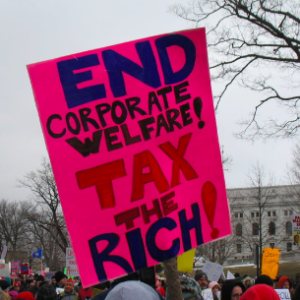Editor’s Note: For another viewpoint see No, Federal Taxes Are Too High
We’ve been cutting taxes on the wealthy for two generations, and the results have been dismal.
Economists, who started as generally supportive of the tax cut experiment, have seen enough. By 2017, only 2 percent of the University of Chicago’s Economics Expert Panel agreed the Trump tax cuts would lead to faster economic growth. The 98 percent were right.
The economy is growing slower, and budget deficits are rising faster than tax-cutters promised. Yet the same people are arguing for more tax cutsto solve the problem. We don’t need another drink to steady our nerves before we get behind the wheel. It’s time to sober up, raise taxes on the wealthy, restore our progressive tax system and get our economy growing again.
How could the economy grow faster with higher taxes? It’s hard for most Americans to remember how radically different our tax code was during the glory days of the U.S. economy, but we used to tax the rich, much more, and we taxed the super-rich much more still.
From the end of World War II into the 1970s the United States experienced rapid, broadly shared growth under a dramatically more progressive tax system than we have today. Between 1945 and 1980 we had an average of 24 different tax brackets (there are seven today) with a top income tax bracket starting at 137 times higher income than the lowest bracket (today that number is closer to 30), and a top rate between 70 percent and 90 percent.
Halfway through the tax cut experiment, it was possible to believe it could work, but with an additional 20 years of data we know more about how tax cuts — and tax cutters — work. And it’s hard to take either seriously.
Real economic growth was faster in each of the three decades before 1980 than in any decade since, both for overall GDP growth and after adjusting for population growth. After the failure of the 1980s tax cuts, George W. Bush passed large tax cuts for the rich in 2001 and 2003, and growth slowed further, all before the great recession and a lost-decade of income growth.
The good news is we don’t need brilliant insights to get out of this hole, we can just stop digging. Raising taxes on the wealthy, which is extremely popular, will allow us to make the important investments in our future — in education, in career and family supports, in scientific research and physical infrastructure — that we’ve been short-changing for a generations. We can get back to relying on innovation for economic growth that’s broadly shared and makes all our lives better.
Another bonus is that the people who have bothered to look have confirmed the failure of tax cuts for so long that there are numerous good ideasfor leveling the playing field without raising a dime from middle-class families. There are proposals for millionaire (and multi-millionaire!) surtaxes, wealth taxes, mark-to-market
This is no doubt worrying for tax cutters, who have grown used to winning the argument with disingenuous claims about unpopular policies. But tax cutters can relax because all along they’ve had the power to close their eyes, tap their heels together three times and go back to Kansas. … Where they can enjoy the catastrophic effects of a different tax cut experiment gone horribly wrong.
For at least 15 years now, it’s been the right time to raise taxes on the wealthy. It will lead to a fairer, stronger economy, that will grow faster as we make the public investments we’ve been delaying for decades. And as economists have gotten more sophisticated about taxes, evidence for taxing the wealthy has gotten much stronger. The only thing that’s easier to predict is that the usual characters will claim the solution to the harms begotten by decades of tax cuts for the wealthy is a Shiny New Tax Cut. It’s our fault if we believe them.

